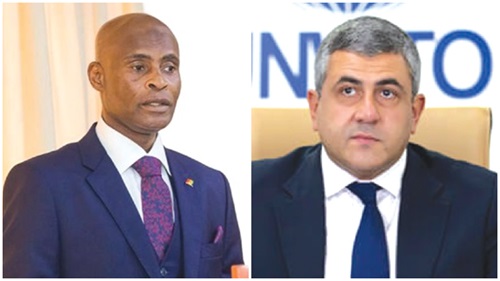The global tourism sector is gearing up for an important decision – the election of a new Secretary-General for UN Tourism in May.
The stakes are high, as the next leader of this UN-specialised agency will guide international tourism policy from 2026 to 2029, shaping recovery, sustainability, and growth in a sector still navigating post-pandemic realities.
As the process unfolds, Ghana has thrown its weight behind its candidate, Muhammad Adam, a career diplomat who has served in multiple postings, including Ghana’s ambassador to Spain.
With President John Mahama publicly endorsing Adam’s candidature, Ghana is actively engaging member states to rally votes for him at the Executive Council meeting.
While Africa has two candidates in the race – Adam from Ghana and Habib Ammar from Tunisia – both face stiff competition from strong contenders across the globe, including the incumbent Secretary-General, Zurab Pololikashvili, who is seeking a third term.
Global contest
Six candidates from different regions have officially declared their interest in the position and have been backed by their respective countries to contest.
Muhammad Adam (Ghana): Ghana’s representative in the race, Adam, has a strong diplomatic background. Having served as Ghana’s ambassador to Spain and consul general in Jeddah, his international experience positions him as a capable candidate.
While his specific vision for UN Tourism is yet to be widely publicised, Ghana’s strong backing suggests a campaign focused on amplifying Africa’s tourism potential on the global stage.
Shaikha Al Nowais (United Arab Emirates): The UAE’s candidate, Al Nowais, comes from a business and audit background, currently serving as Corporate Vice President – Owners’ Relationship Management at Rotana Hotel Management Corporation PJSC.
While her tourism-specific experience is limited compared to other candidates, her financial acumen could bring a new dimension to UN Tourism’s strategy, focusing on investment and accountability.
Habib Ammar (Tunisia): A tourism expert from Tunisia, Ammar, has been instrumental in developing Tunisia’s travel industry.
His campaign is expected to focus on sustainable tourism growth, increased cooperation among African and Mediterranean countries, and driving digital innovation in the industry.
Gloria Guevara (Mexico): The former Mexican Secretary of Tourism and ex-president of the World Travel & Tourism Council (WTTC), Guevara is a formidable candidate.
She has expressed a desire to restore UN Tourism’s credibility and influence, aiming to make it a more proactive force in global tourism policy. Her agenda includes strengthening UN Tourism’s role in sustainable development and job creation.
Zurab Pololikashvili (Georgia - Incumbent): Serving as Secretary-General since January 2018, Pololikashvili has led UN Tourism through one of its most challenging periods – the COVID-19 pandemic.
His tenure saw a push for tourism recovery strategies, innovative initiatives such as the ‘Best Tourism Villages’ programme, and efforts to expand regional offices in Africa and Asia.
He also spearheaded the reformation and rebranding of the UN World Tourism Organisation (UNWTO) into the current UN Tourism, aiming to enhance its global recognition and efficiency.
His proposals for a third term include promoting sustainable rural and urban tourism, increasing investment opportunities, and strengthening specialised tourism sectors such as gastronomy and sports tourism.
Harry Theoharis (Greece): A former Greek Minister of Tourism, Theoharis’ vision revolves around integrating major non-member states such as the United States, the UK, and Australia into UN Tourism, enhancing digitalisation, and pushing for stronger sustainable tourism policies.
His focus on expanding membership and fostering greater cooperation could reshape the organisation’s global reach.
The Africa factor
Africa’s tourism sector has long sought stronger representation in global policymaking, and having two candidates from the continent highlights this ambition.
Ghana’s active diplomacy in securing votes for Muhammad Adam underscores the importance the country places on the role.
However, Africa’s vote could be split between
Adam and Ammar, potentially diminishing the continent’s collective influence in the election and leading the organisation for the first time.
While Ghana’s efforts to rally support are commendable, the reality remains that a seasoned leader with a proven track record will be best suited to navigate the complexities of global tourism recovery and growth.
This is where the case for Zurab Pololikashvili’s re-election gains traction.
Retaining Zurab
Despite the presence of strong contenders, Pololikashvili’s leadership has been instrumental in keeping global tourism afloat during the pandemic.
His ability to mobilise resources, spearhead recovery programmes, and push for investment in Africa and other regions demonstrates his effectiveness.
His plans for the next four years – including expanding regional offices in Africa and Asia, increasing tourism investment, and strengthening sector-specific tourism initiatives – align with the needs of developing economies.
Moreover, Pololikashvili’s tenure has continued the legacy of strong leadership within UN Tourism.
The organisation has been helmed by notable figures including Robert Lonati, the first WTO Secretary-General; Francesco Frangialli, who played a key role in the agency’s early expansion; and Taleb Rifai, who served multiple terms and emphasised sustainable tourism policies.
As the current Secretary-General, Pololikashvili has carried this tradition forward by modernising the institution and enhancing its global impact.
At a time when continuity and strategic expansion are crucial, re-electing a leader who has already laid the groundwork for sustainable tourism growth may be the most prudent choice.
While fresh perspectives from other candidates bring exciting possibilities, the industry’s need for stability and proven leadership cannot be overlooked.
As the Executive Council prepares to make its recommendation from May 29-30 in Madrid, followed by the General Assembly’s final decision in November, the future of global tourism governance hangs in the balance.
Whether Ghana’s diplomatic push will see an African candidate rise to the helm for the first time or whether Zurab will secure a historic third term remains to be seen.
One thing is certain: the outcome will shape the global tourism landscape for years to come.

